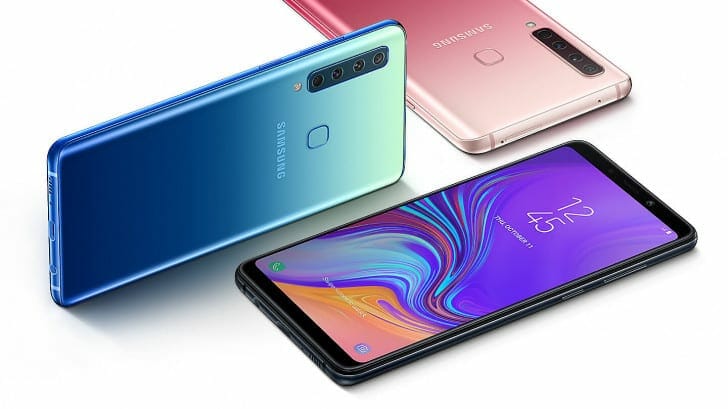There was a time not so long ago when smartphones came with a single rear camera and a usually one in the front. Then we saw the rise of dual rear camera smartphones with brands like Huawei taking the charge and other more popular brands like Samsung and Apple following in its tracks. Triple camera smartphones became a thing early this year when the Huawei P20 Pro was launched and before you know it other manufacturers jumped on the bandwagon. Today, we have confirmation that the camera race continues with the announcement of Samsung Galaxy A9, a freakin 4 rear camera smartphone.
Yes, you read that right, Samsung Galaxy A9 is the first ever Smartphone featuring 4 rear cameras. In a Galaxy event today held in Malaysia, the company unveiled the first smartphone to feature 4 rear cameras. In the leaks and rumors preceding the announcement, people had speculated that Samsung was going to pull something like this but it sounded too ambitious to be believed. Now to our surprise, Samsung has actually delivered and unveiled the next big trend in the smartphone world. However, it stands to reason that the camera race may not be all that spectacular given how a smartphone with a well equipped single rear camera triumphs over a dual camera setup.
Take the recent flagship by Google, the Pixel 3, it is a much-awaited smartphone of the year 2018 and although it was leaked excessively in the preceding months, it came as no surprise that Google opted for a single rear camera configuration. The reason is that Google believes a well crafted single lens equipped with capable AI and software will outperform multi-camera setups. This claim is true if you compare Pixel 2’s camera with flagships from Samsung and Apple having dual camera configs.
So it is not completely irrational to think that perhaps the multiple cameras on smartphones is at most a marketing gimmick and has diminishing returns after a certain point. However, since the Samsung Galaxy A9 has just been announced and no review models are available to critics, we cant draw our conclusions from mere assumptions. The Pixel 3 has also just been recently launched so we will see how its single rear camera holds up to the multi-cam competition.
Samsung Galaxy A9 Specs
| OS | Android 8.0 Oreo |
| Display | 6.3” Full HD+ Super AMOLED (1080×2220) |
| Processor | Qualcomm Snapdragon 710, Octa-core (2.2GHz Quad + 1.8GHz Quad) |
| RAM | 6 or 8GB |
| Storage | 128GB + MicroSD Slot (up to 512GB) |
| Rear Cameras | – Main Camera: 24MP AF, F1.7 – Telephoto : 2X optical zoom, 10MP AF, F2.4 – Ultra Wide: 120°, 8MP, F2.4 – Deapth: 5MP, F2.2 |
| Front Camera | 24MP, F2.0 |
| Battery | 3,800mAh |
| Connectivity | Wi-Fi 802.11 a/b/g/n/ac (2.4/5GHz), VHT80 MIMO, Bluetooth® v 5.0 (LE up to 2Mbps), ANT+, NFC, Location (GPS, Galileo*, Glonass, BeiDou*) Network: 3CA, LTE Cat.9 |
| Sensors | Accelerometer, Fingerprint Sensor, Gyro Sensor, Geomagnetic Sensor, Hall Sensor, Proximity Sensor, RGB Light Sensor |
| Ports | USB Type-C |
| Headphone jack | Yes |
| Dimensions | 162.5 x 77 x 7.8 mm |
| Weight | 183g |
On the front, the phone features a beautiful 6.3 inch Full HD+ (2,220×1,080) Super AMOLED display. The bezels are also thin, however, there is a chin at the bottom and most importantly no notch. The four cameras as mentioned in the specs above varying functionalities like a main 24MP shooter (f/1.7) complemented by telephoto, ultra wide, and depth sensors.
Apart from the cameras, the A9 boasts all the usual top-tier specs you would expect from such a phone. I will point out the battery which is a 3800 mAh battery. I am always a big fan of bigger capacity batteries because what use is your smartphone, 4 cameras or none, if it doesn’t have the juice to get you through the day. Also, as always the headphone jack is included which seems like too much to ask these days *Looking at Apple*.
Samsung will offer either 6 or 8GB of RAM, and both come with 128GB of storage. As for the colors, three colorways are available: Caviar Black, Lemonade Blue, and Bubblegum Pink, with the latter two presenting eye-catching Huawei-style gradient finishes.
This is all for now, let us know in the comments what your take on the Samsung Galaxy A9 is.

